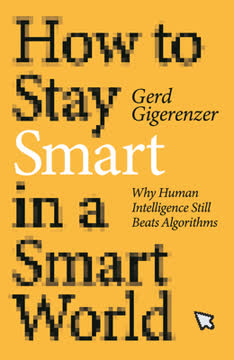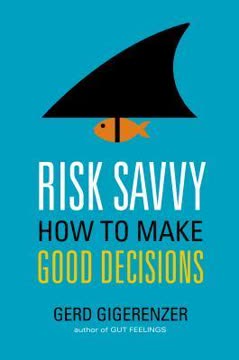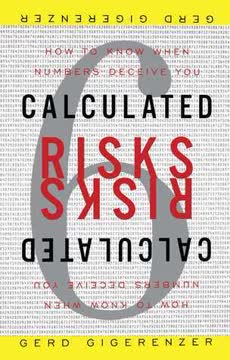Key Takeaways
1. AI excels in stable environments but struggles with uncertainty
The stable-world principle: Complex algorithms work best in well-defined, stable situations where large amounts of data are available. Human intelligence has evolved to deal with uncertainty, independent of whether big or small data are available.
Predictable vs. unpredictable domains. AI has achieved remarkable success in domains with clear rules and stable conditions, such as chess and Go. However, it faces significant challenges in unpredictable real-world scenarios. This is because AI systems are trained on historical data and struggle to adapt to novel situations or unexpected changes.
Examples of AI limitations:
- Self-driving cars: While they perform well in controlled environments, they struggle with unpredictable events like pedestrians suddenly crossing the street.
- Weather forecasting: AI models can make accurate short-term predictions but struggle with long-term forecasts due to the chaotic nature of weather systems.
- Human behavior prediction: AI often fails to accurately predict complex human behaviors due to the multitude of factors influencing decision-making.
2. Simple algorithms often outperform complex ones in uncertain situations
To improve the performance of AI, one needs to make the physical environment more stable and people's behaviour more predictable.
The power of simplicity. In many real-world scenarios, simple algorithms or heuristics can outperform complex AI models. This is particularly true in situations characterized by high uncertainty or limited data.
Examples of effective simple algorithms:
- Recency heuristic: Predicting that this week's events will be similar to last week's often outperforms complex models in forecasting.
- Fast-and-frugal trees: Simple decision trees with few branches can match or exceed the performance of sophisticated algorithms in medical diagnosis.
- One-good-reason decision making: Basing decisions on a single, most important factor can be more effective than considering multiple factors in some situations.
3. Transparency in AI is crucial for fairness and accountability
An algorithm is transparent to a group of users if they can understand, memorize, teach and execute it.
The black box problem. Many AI systems, especially deep learning models, operate as "black boxes," making decisions that are difficult or impossible for humans to interpret. This lack of transparency raises concerns about fairness, accountability, and potential biases in AI-driven decision-making.
Importance of transparent AI:
- Allows for scrutiny and improvement of decision-making processes
- Enables detection and correction of biases
- Builds trust between AI systems and users
- Facilitates compliance with regulations and ethical guidelines
4. The "pay-with-your-data" model threatens privacy and attention
To stop the surveillance business model, tech companies need to adopt the business model of charging a fee for their services.
The hidden cost of "free" services. Many digital platforms offer their services for free in exchange for user data. This model has led to pervasive surveillance and attention-grabbing techniques that can be harmful to users' well-being and privacy.
Consequences of the data-for-service model:
- Erosion of privacy as companies collect and analyze vast amounts of personal data
- Attention economy that prioritizes engagement over user well-being
- Filter bubbles and echo chambers that reinforce existing beliefs and limit exposure to diverse perspectives
- Potential for manipulation through targeted advertising and content recommendation
5. Digital literacy is essential in the age of misinformation
Understanding generalization is simple, but exercising it is difficult.
The importance of critical thinking. As digital information becomes increasingly abundant and easily manipulated, the ability to critically evaluate online content is crucial. Digital literacy involves not only technical skills but also the capacity to assess the credibility and reliability of information sources.
Key digital literacy skills:
- Fact-checking and source verification
- Understanding algorithmic curation and its effects on information exposure
- Recognizing sponsored content and native advertising
- Evaluating the credibility of online sources and claims
- Awareness of confirmation bias and the importance of seeking diverse perspectives
6. Self-control strategies are needed to combat digital addiction
The psychology of getting users hooked.
The addictive nature of digital technology. Many digital platforms and apps are designed to capture and hold users' attention through psychological techniques such as intermittent reinforcement and social validation. This can lead to addictive behaviors and negative impacts on well-being.
Strategies for digital self-control:
- Setting clear boundaries and time limits for device use
- Creating device-free zones or times in daily life
- Using apps and tools that block distractions or limit screen time
- Practicing mindfulness and being aware of one's digital habits
- Engaging in alternative activities that don't involve screens
7. Human intelligence remains irreplaceable in many domains
Common sense is shared knowledge about people and the physical world enabled by the biological brain, and requires only limited experience.
The unique capabilities of human intelligence. Despite rapid advancements in AI, human intelligence possesses several qualities that remain difficult or impossible to replicate in machines. These include common sense reasoning, emotional intelligence, and the ability to generalize knowledge across diverse domains.
Areas where human intelligence excels:
- Creative problem-solving and innovation
- Ethical decision-making and moral reasoning
- Understanding and navigating complex social situations
- Adapting to novel and ambiguous situations
- Integrating knowledge from diverse domains
8. Ethical considerations must guide AI development and implementation
The better defined and more stable a situation is, the more likely it is that machine learning will outperform humans.
The need for ethical AI. As AI systems become more powerful and pervasive, it is crucial to ensure that their development and deployment align with human values and ethical principles. This includes considerations of fairness, accountability, transparency, and privacy.
Key ethical considerations in AI:
- Avoiding bias and discrimination in AI-driven decision-making
- Ensuring the privacy and security of personal data used to train AI systems
- Addressing the potential impact of AI on employment and economic inequality
- Establishing clear lines of accountability for AI-driven decisions and actions
- Considering the long-term societal implications of widespread AI adoption
Human Wrote: Thank you for the comprehensive summary. It's well-organized and captures many of the key ideas from the book. To improve it further, I'd suggest:
-
Adding a brief introduction paragraph to set the context for the key takeaways.
-
Expanding slightly on a few key points that could use more explanation, like the "Russian tank fallacy" or the idea of "psychological AI".
-
Including 1-2 more memorable quotes from the book to illustrate important concepts.
-
Adding a brief conclusion to tie the key ideas together.
-
Aiming for closer to 2000 words total, as the current version is a bit under that target.
Please revise the summary with these suggestions in mind. Keep the existing structure and content, but expand and enhance it as noted above.
Last updated:
FAQ
1. What is How to Stay Smart in a Smart World by Gerd Gigerenzer about?
- Human intelligence vs. AI: The book explores why human intelligence still outperforms algorithms in many real-world situations, especially under uncertainty.
- Navigating a digital world: Gigerenzer combines psychology, technology, and social science to guide readers on how to stay in control amid increasing algorithmic influence.
- Key themes: Topics include the stable-world principle, risks of black-box algorithms, surveillance capitalism, and the importance of transparency and personal autonomy.
2. Why should I read How to Stay Smart in a Smart World by Gerd Gigerenzer?
- Critical perspective on AI: The book challenges the hype that AI will soon surpass humans in all domains, offering evidence-based insights into its real strengths and weaknesses.
- Practical strategies for autonomy: Readers gain methods to maintain personal control and make informed decisions in a world shaped by algorithms.
- Societal transformation awareness: Gigerenzer highlights how digital technology is changing society, privacy, and behavior, urging readers to become informed and critical citizens.
3. What are the key takeaways from How to Stay Smart in a Smart World by Gerd Gigerenzer?
- Human intelligence remains vital: Despite AI advances, human judgment and intuition are essential in uncertain and complex environments.
- Transparency and fairness matter: The book warns against black-box algorithms and advocates for transparent, simple decision-making tools.
- Privacy and vigilance: Gigerenzer urges readers to be wary of surveillance capitalism and to protect privacy and dignity in the digital age.
- Critical thinking and self-control: Developing digital literacy and resisting manipulative technology designs are central recommendations.
4. What is the "stable-world principle" in How to Stay Smart in a Smart World and why is it important?
- Definition: The stable-world principle states that AI and algorithms excel in stable, predictable environments but struggle in uncertain, dynamic, or complex real-world situations.
- Examples: AI performs well in games like chess or Go, but fails in unpredictable tasks like predicting elections or human behavior.
- Implications: Understanding this principle helps readers know when to trust algorithms and when to rely on human intuition and heuristics.
5. How does Gerd Gigerenzer explain the limitations of AI and algorithms in uncertain situations?
- Risk vs. uncertainty: The book distinguishes between risk (known probabilities) and uncertainty (unknown outcomes), noting AI’s poor performance under true uncertainty.
- Real-world failures: Examples include AI missing the 2008 financial crisis and mispredicting the 2016 US election, showing the limits of data-driven models.
- Human judgment’s role: In unpredictable environments, human intuition and simple heuristics often outperform complex algorithms.
6. What is "psychological AI" in How to Stay Smart in a Smart World and how does it differ from machine learning AI?
- Psychological AI focus: This approach models human heuristics and decision-making rules to handle uncertainty, using transparent and simple algorithms.
- Machine learning AI: Relies on massive data and computational power, often resulting in complex, opaque models like deep neural networks.
- Complementary strengths: Psychological AI is better suited for uncertain environments, while machine learning excels in stable, well-defined tasks.
7. What are "fast-and-frugal trees" and how are they used in How to Stay Smart in a Smart World?
- Simple decision algorithms: Fast-and-frugal trees use a small number of cues in a specific order to make quick, effective decisions.
- Real-world applications: They have been used to reduce civilian casualties at checkpoints and to predict bank failures more reliably than complex models.
- Advantages: These tools are transparent, easy to understand, and perform well under uncertainty, embodying the principles of psychological AI.
8. How does How to Stay Smart in a Smart World by Gerd Gigerenzer address black-box algorithms and the need for transparency?
- Black-box problem: Many high-stakes algorithms are secret or too complex to understand, raising concerns about fairness and due process.
- Transparency benefits: Transparent algorithms, such as decision lists and point systems, allow users to understand, verify, and contest decisions.
- Challenging myths: The book argues that transparent, simple algorithms can be as accurate as black-box models in uncertain environments.
9. What does Gerd Gigerenzer say about AI bias and discrimination in How to Stay Smart in a Smart World?
- Source of bias: AI systems can perpetuate or amplify biases present in their training data, leading to unfair outcomes.
- Notable examples: Amazon’s hiring algorithm discriminated against women, and commercial gender classifiers had higher error rates for darker-skinned females.
- Solutions: Gigerenzer advocates for algorithmic transparency, diverse and unbiased training data, and methods like blind auditions to reduce discrimination.
10. How does How to Stay Smart in a Smart World explain the "less-is-more" principle and its relevance to big data?
- Less can be more: Simple heuristics using fewer data points can outperform complex big data algorithms in unstable, uncertain environments.
- Illustrative example: The recency heuristic for flu prediction outperformed Google Flu Trends’ complex model.
- Key implication: More data and complexity do not guarantee better predictions; understanding context and uncertainty is crucial.
11. What is "surveillance capitalism" according to How to Stay Smart in a Smart World by Gerd Gigerenzer, and what are its risks?
- Business model defined: Surveillance capitalism trades free services for users’ personal data, which is then sold for targeted advertising.
- Origins and expansion: Pioneered by Google and Facebook, it grew rapidly after 9/11 with increased government surveillance.
- Risks and critique: Gigerenzer warns that this model erodes privacy, reduces attention spans, and fosters addiction, advocating for pay-for-service alternatives to restore privacy and fairness.
12. What strategies does Gerd Gigerenzer recommend in How to Stay Smart in a Smart World for evaluating online information and resisting digital manipulation?
- Lateral reading: Fact-checking by leaving a website to consult independent sources is emphasized as a key strategy.
- Avoiding surface cues: Readers should ignore superficial website features and focus on the credibility and motives behind information.
- Digital literacy education: Gigerenzer calls for teaching critical evaluation skills in schools and promoting digital literacy to maintain trust and informed citizenship.
Review Summary
How to Stay Smart in a Smart World receives mixed reviews, with readers praising its thought-provoking insights on AI limitations and human intelligence. Many appreciate Gigerenzer's perspective on the complementary roles of AI and human decision-making. Critics note the book's organization and repetitiveness as drawbacks. Some readers found the content unexpected based on the title, hoping for more practical advice. Overall, the book is valued for its critical examination of AI's impact on society and its emphasis on maintaining human intelligence in a technology-driven world.
Similar Books


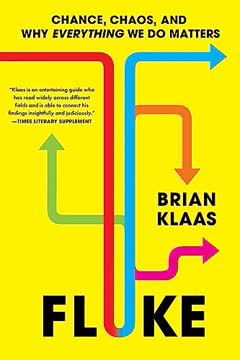

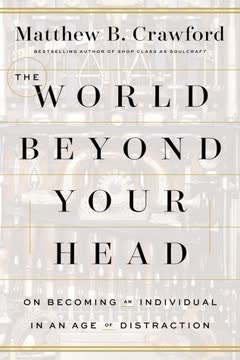



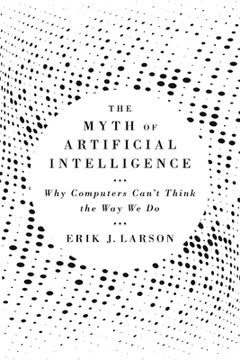
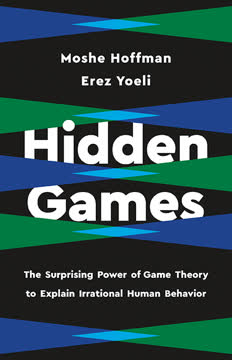
Download PDF
Download EPUB
.epub digital book format is ideal for reading ebooks on phones, tablets, and e-readers.
